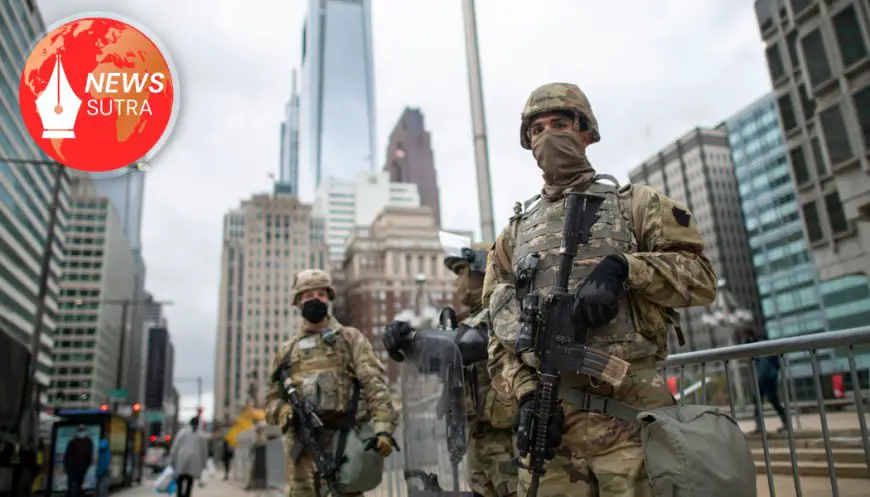National Guard Deployment by President Trump Sparks Nationwide Debate
President Donald Trump’s recent National Guard deployment has reignited debates over federal authority, public safety, and political strategy. Here's a deep dive into what it means for America.

In a move that has drawn both support and scrutiny, former President Donald Trump has ordered the deployment of National Guard troops across several U.S. cities amid growing political unrest and escalating public demonstrations. This decision, announced earlier this month, has triggered a nationwide conversation on federal overreach, public safety, and constitutional authority.
While some view the action as a necessary response to restore order, others see it as an alarming display of executive power that raises profound civil liberties concerns.
What Prompted the Deployment?
According to a recent statement from the Department of Defense, the decision was made following reports of civil disturbances, infrastructure threats, and a surge in organized protests targeting federal properties. President Trump, during a press briefing, cited the need to “maintain law and order” and “protect the interests of the American people.”
Analysts suggest the move aligns with Trump’s broader strategy to reassert a law-and-order platform as he gears up for the 2026 midterms, where several key Republican Senate seats are at stake.
Where Are Troops Being Deployed?
The National Guard presence has been notably increased in major metropolitan areas, including:
-
Chicago, Illinois
-
Portland, Oregon
-
Atlanta, Georgia
-
Washington, D.C.
In a notable development, units have also been stationed near border regions, prompting speculation that the deployment may also serve immigration control purposes. This has not been explicitly confirmed by the White House, but policy experts are drawing comparisons to Trump’s earlier actions during his first term in 2020.
For historical context, you can read The Brookings Institution’s analysis of previous National Guard uses during civil unrest.
Reactions from State Officials
Not all state leaders are on board. Governor Tina Kotek of Oregon has publicly denounced the deployment in Portland, calling it an “unwelcome interference in state jurisdiction.” Her sentiments have been echoed by other Democratic governors who argue that the federal government is overstepping its constitutional bounds.
Conversely, Republican governors like Ron DeSantis of Florida have praised the move, calling it a "decisive action" to ensure safety and security.
For a deeper understanding of state vs. federal authority, this article from the National Conference of State Legislatures provides valuable insight.
Legal and Constitutional Implications
Legal experts are now dissecting the constitutional basis of Trump’s decision, especially in light of Posse Comitatus Act limitations, which restrict federal military involvement in domestic law enforcement.
“The deployment of the National Guard by a sitting or former president must be carefully scrutinized to ensure compliance with the Constitution,” said Prof. Laurence Tribe, a constitutional law scholar at Harvard Law School. “While the National Guard can be federally mobilized, it requires justification under specific federal laws, such as the Insurrection Act.”
Learn more about the Insurrection Act and its modern interpretations.
Political Ramifications
Trump’s move is widely seen as politically strategic. His base largely supports a strong national security posture, and by projecting control over domestic turmoil, he is signaling readiness for a potential re-election campaign.
A recent Gallup poll indicates that public confidence in government institutions remains low, and security-based decisions like this often receive mixed reactions depending on party affiliation.
“This is classic Trump,” said Dr. Rachel Bitecofer, a political analyst and strategist. “He’s betting that strongman tactics will play well with swing voters concerned about instability.”
Public Sentiment and Civil Liberties
Civil rights organizations such as the ACLU and Human Rights Watch have expressed deep concern over the deployment. In a joint statement, the ACLU noted that “military presence in civilian areas risks escalating tensions rather than de-escalating them.”
Social media platforms have seen a surge in activism, with hashtags like #GuardTheGuardrails and #TrumpDeploysTroops trending on X (formerly Twitter). Citizens and community leaders are calling for transparency, urging congressional oversight on any further troop movements.
Stay informed through reputable media coverage at NPR and The Washington Post, both of which are providing real-time updates and interviews with military experts.
What Happens Next?
Congress is expected to hold hearings later this month to investigate the justification and scope of the National Guard deployments. Several senators, including Senator Elizabeth Warren, have called for stricter legislative checks on presidential power in times of civil unrest.
Meanwhile, the Department of Homeland Security continues to coordinate with National Guard units and local law enforcement agencies, indicating that the deployments may extend through the summer depending on ongoing risk assessments.
Final Thoughts
The recent deployment of the National Guard by President Donald Trump is more than a security measure—it is a political, legal, and societal flashpoint that touches on the very fabric of American democracy. As events unfold, it’s essential for citizens to stay informed, question authority where needed, and engage with credible sources.
For additional resources on civic rights and security protocols, visit:














